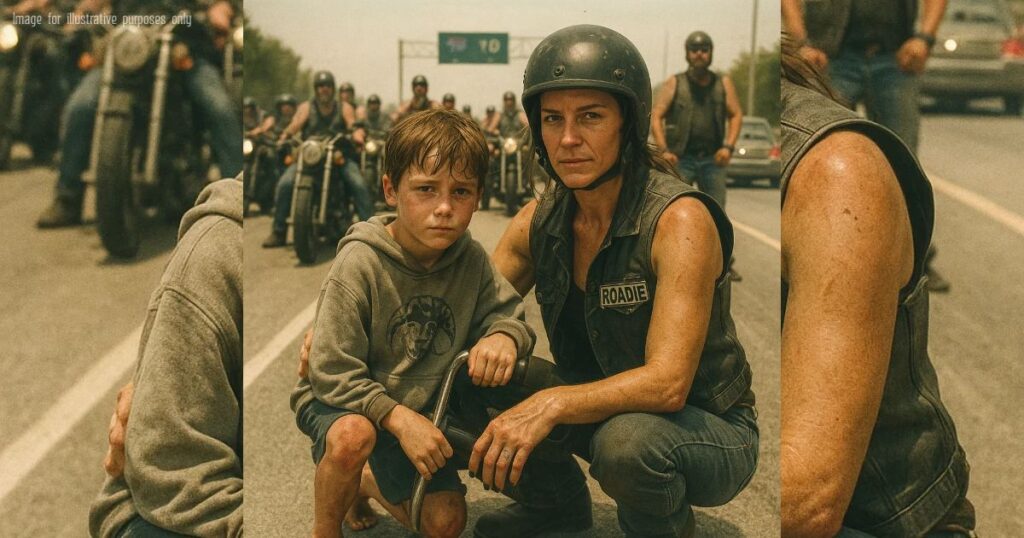We didn’t touch a thing. We drew our bikes into a quiet circle around the far edge of the lot, headlights angled low.
The truckers idled across the street, their running lights blinking slow like a heartbeat. The wind found a soda can and taught it to sing.
“Warrant en route,” Ramirez said into her mic. “Nobody goes in. Nobody goes near. We do this clean.”
She watched the road for taillights. We watched the rooflines for a flicker of movement, a notch of shadow where it shouldn’t be.
Noah leaned against my side, staring at those blue doors like an ocean he was learning not to fear. “He said my dad wouldn’t find me,” he whispered. “Said nobody would look where it smells like paint.”
“We’re looking,” I said. “All night if we have to.”
The warrant arrived with two cruisers and a county SUV. Our engines went dark, one by one, until the lot held its breath.
The only sounds were wildlife and the quiet communication of people who know which two words matter most: “You ready?”
They rolled the first door. Air moved like it remembered how—cold, stale, and small.
And then—sounds I will not decorate for drama. A cough. A hiccup. The shiver of a space blanket.
A tiny “hi?” like someone asking permission to exist.
No one rushed or shouted. Ramirez’s team took the room like a church: a step, a whisper, a hand outstretched.
A child’s hand took it. Then another. Then two more.
Noah’s grip crushed my fingers. He didn’t cry. I did.
They came out swaddled in silver and kindness, eyes blinking at the sudden attention. Their cheeks were hollowed from days of too little and too long.
Our riders stepped back and got small. That’s a trick leather can learn if it wants to.
“You did good,” I told Noah, and I meant it all the way to the rivets of my soul. “You ran. You told the truth. You stayed loud enough to be found.”
“My dad,” he said. “Will he be mad?”
“Mad at the world,” I said. “Not at you.”
The SUV driver had tried to make a break earlier, right before Ramirez cuffed him without raising her voice. The story would later spool out in courtrooms and news clips I avoided.
I kept my eyes on what I could hold: small fingers, safe breaths, the physics of a hand that was free.
It took until 2 a.m. for the county to finish the scene. When we finally kicked stands and swiveled toward home, none of us went far.
We drifted to the shoulder again, the place where asphalt meets weeds, where small lives turn on ridiculous chances. Someone passed around bottles of water.
Someone else passed a phone, and Noah spoke to a voice two states away. “Hey, Dad,” he said. “I’m okay.”
I don’t know what his father did for work, but I know the sound a grown man makes when relief is bigger than his ribs. It is a kind of sob you don’t put on video. You put it in your pocket and guard it with your life.
A week later the county courtroom was too small for the number of jackets in it—uniform blue and worn-in black. We stood like fence posts along the hallway while families moved between us.
People said “thank you” in a hundred versions. We said “you’re welcome” in one: a nod that meant “we showed up because that’s what neighbors do.”
We didn’t start a club after that. We started a list.
The list included truckers who’ll swing lights without asking why, and motel clerks who keep a book and a backbone. It had riders who can spot a lie and dispatchers who will listen to a voice they don’t recognize yet.
We called it Leather Lanterns because someone joked that our headlights had been the only lamps on County 19, and the name stuck.
The list grew. Not sensational or heroic. Just present.
Last month, a woman on our list spotted a sedan at a rest stop with a child’s shoe under the front seat and no car seat in sight. She didn’t confront; she called. She stayed long enough to make sure the plate number didn’t go anywhere.
A deputy met the car at the next exit. A kid went home before anyone had to learn how to be brave on burning asphalt.
Sometimes I ride past the storage place at dawn. The blue doors look like the sky when the day’s young. The flag out front is new now, and the exit sign flickers less.
Somebody cares more than they used to.
We still get side-eyed at the grocery sometimes. Leather, loud, tattoos that tell the truth about our pasts. I don’t mind.
If angels exist, some probably look like choirboys. Some smell like sunblock and cut grass.
Some of them ride.
When we take I-70 these days, we roll a little slower by the tree line. We count shadows like beads. We look for small hands.
We keep the light ready. We ride for the ones who can’t.
And when the dark thinks it can hide in plain sight, we turn our headlights toward it. We wait, steady and stubborn, until it gives up what never belonged to it in the first place.
Thank you so much for reading this story!
I’d really love to hear your comments and thoughts about this story — your feedback is truly valuable and helps us a lot.
Please leave a comment and share this Facebook post to support the author. Every reaction and review makes a big difference!
This story is a work of fiction created for entertainment and inspirational purposes. While it may draw on real-world themes, all characters, names, and events are imagined. Any resemblance to actual people or situations is purely coincidenta


